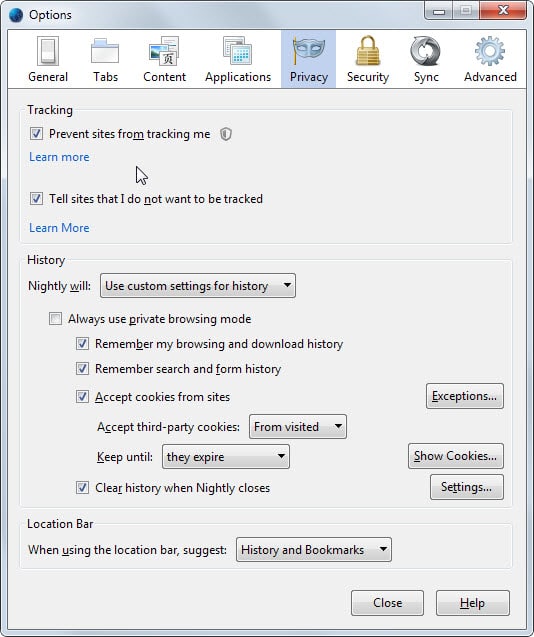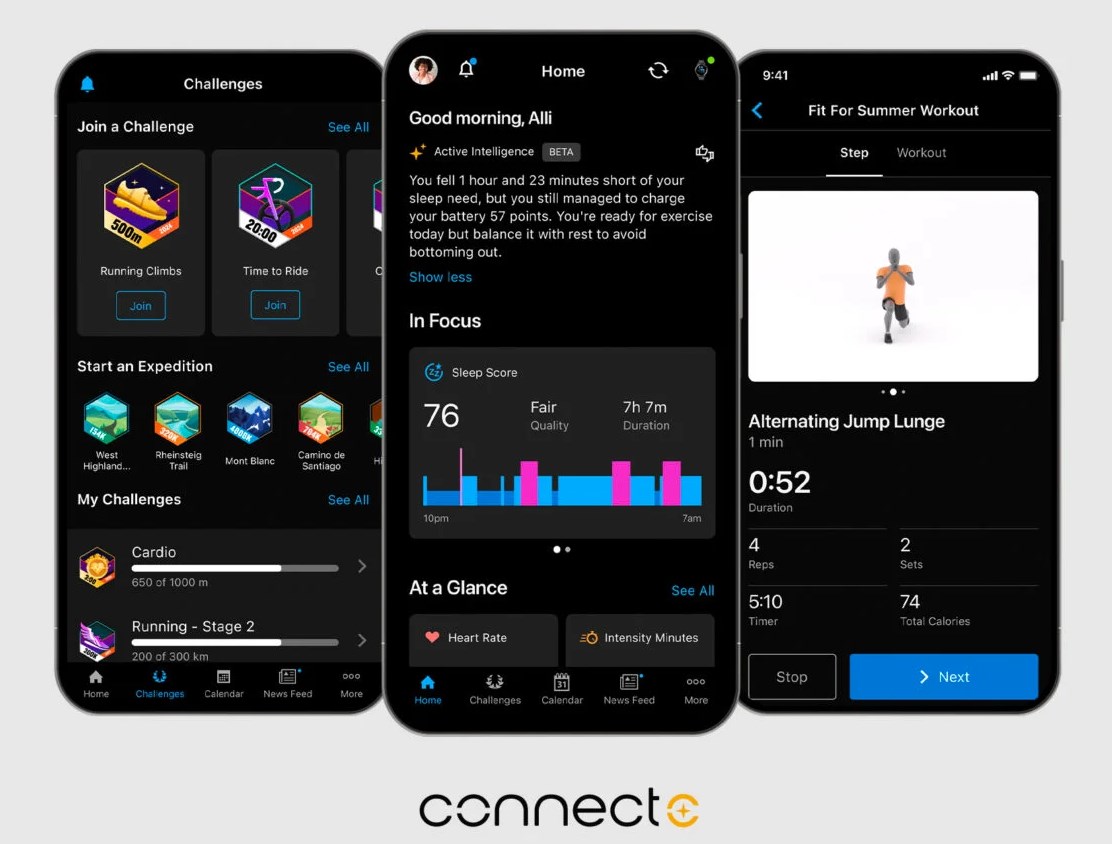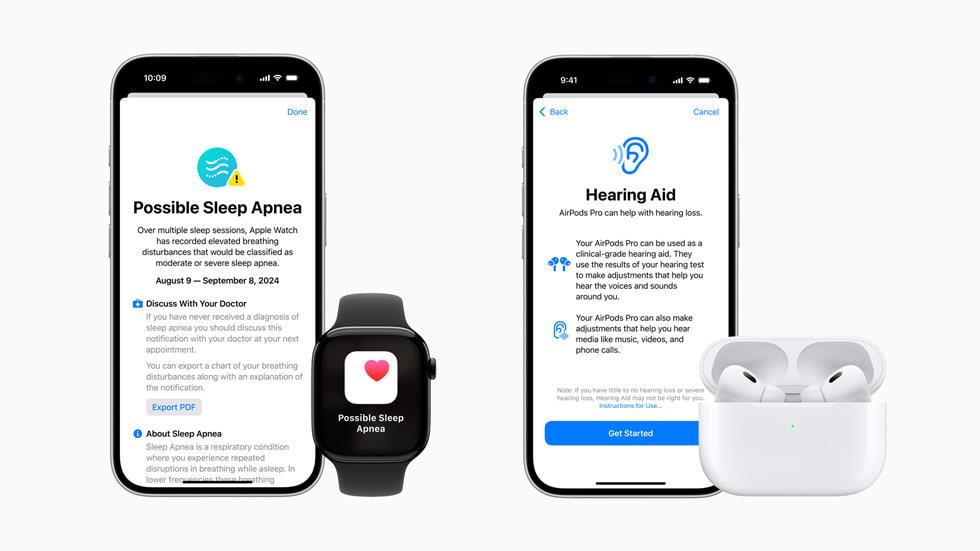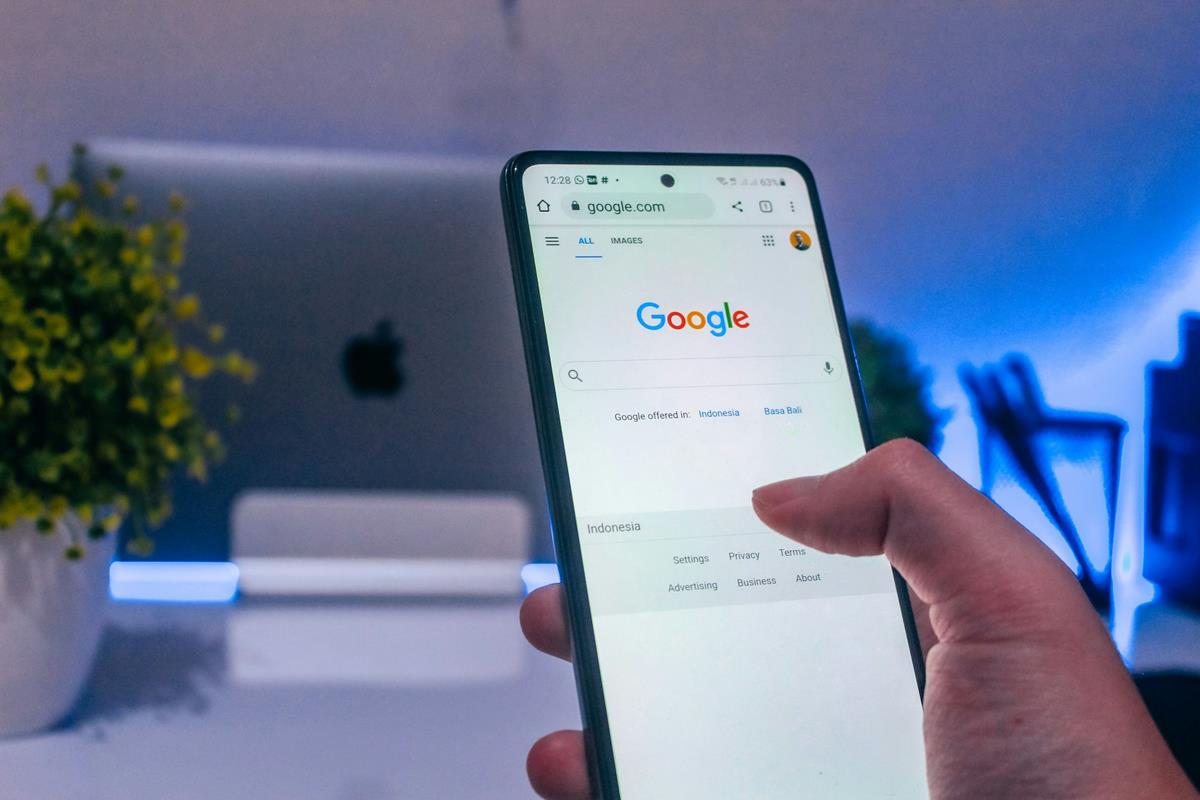Firefox 39: Tracking Protection for private browsing mode
Mozilla has been working on a privacy feature called Tracking Protection for some time now. The feature is currently only available in Nightly versions of the desktop version of the web browser and there only after activation. The feature landed in Firefox for Android too but has not found its way to the stable version of the mobile browser yet as well.
What it does, at least in its current form, is to use data provided by Disconnect to block certain web trackers from being executed on websites that you visit.
This works similar to other blocking-type of extensions but with the difference that you have no control over the list, at least not right now.
That does not mean that you cannot allow contents to run anyway in Firefox. A shield icon in Firefox's address bar indicates whether trackers are blocked or not on the active web page.
A click on the icon displays options to disable the protection for the site you are own which Firefox then indicates by a different shield icon.
Up until now, Tracking Protection worked only in regular browsing mode but not in private browsing mode. Considering that private browsing has been designed to block data from being recorded locally, it makes sense to add remote blocking to it as well to limit exposure on the Internet.
The mode is not enabled by default just like the regular tracking protection modes.
- Type about:config in Firefox's address bar and hit the enter key.
- Confirm you will be careful if the message comes up.
- Search for privacy.trackingprotection.pbmode.enabled and double-click on its name afterwards to set its value to true.
- This enables the feature from that moment on.
To turn it off again, repeat the first three steps above and make sure that the parameter is set to false in the end.
Side tip: To enable Tracking Protection for all non-private browsing pages you visit in Firefox, set browser.polaris.enabled to true which does that and adds the new preference to Firefox's privacy menu in the options where you can turn it off or on as you see fit. You could set privacy.trackingprotection.enabled to true alternatively but that won't add the menu option to the privacy menu.
Closing Words
It makes sense to add tracking protection to the private browsing mode as it improves your privacy further when enabled. While that is without doubt no 100% protection against leaks, it is a next step to improve the mode for all users of the browser.
Considering that Tracking Protection is still only available in Nightly versions of Firefox, it is fair to say that Stable users of the browser will have to wait at least three releases before the feature lands in their version of the browser. (via Sören)


















Actually, I just enabled tracking protection in Fx 37.0.1 STABLE !!!
So “nightly” is not required.
hi martin, how to disable html 5 video autoplay on firefox? i have tried flash control addons, disable webm from about:config, disable cisco plugin, but the html 5 video still default video player on firefox
There is no 100% method to do that right now. See this bug dating back to 2011 for additional information: https://bugzilla.mozilla.org/show_bug.cgi?id=659285
Will this protect me from Facebook and all of its hidden, embedded tentacles? How about Google?
The idea behind this feature seems good.
However, if Mozilla values so much its users privacy, maybe should it start by stopping all its hidden data gathering.
If Mozilla would care about their users these days they would still in an active way support Geek users instead of transforming their browser in a mobile product with almost no internal features to change the browser’s look!
Mozilla only cares these days for mobile users, the Desktop user’s needs are of no interest for them any longer!
[insert irrelevant opinion about something Firefox-related that I’m desperate to talk about everywhere]
Including Android numbers, gives Chrome a large lead. Not really fare. Firefox is still popular in Europe, where web privacy is essential.
“The following tables summarize the usage share of all browsers for the indicated month.
For the “all browsers” stats, the Chrome browser includes the Android browser, since both use Blink engine and the apps are very similar. The Safari browser includes the iPhone/iPad/iPod browsers because all these use WebKit and a vast majority of iOS users use Safari.[13]”
Including Android numbers, gives Chrome a large lead. Firefox has larger following in Europe, web privacy is essential.
I completely switched to Palemoon, Firefox these days is slow and redundant
Placebo effect. Pale Moon *is* Firefox… it’s not possible that Palemoon has a much better performance.
Pale Moon is a fork of Firefox 24 ESR. The dev has stripped away features that were not deemed ”necessery” (and call this ‘optimization’). The thing is, you can already turn these features off yourself in Firefox about:config. He uses the older UI shipped with Firefox 24 but once this release becomes outdated, he will have to use The Classic Theme Restorer addon or deal with the Australis UI. Well, technically that means Pale Moon is indeed lighter than the default settings of Mozilla Firefox but at the expense of having no built-in PDF viewer, no Firefox Hello ect.
Sören Excuse me???
Like what you want, but do not demand political correctness from me for trolls which are bashing other products just for pure and simple fandom reasons towards Firefox!
I could not care less for you and your demands and wishes. I do not know you and i can’t remember that i am forced for some obscure reasons in doing you a favor!
Again…
Firefox 22: Browser for smart people
Mozilla Australis: Browser for the Social Networking Generation and simple people
JFYI: If Mozilla would have decided in the first place to keep the removed features inside the browser i also would not have a problem with Australis.
@Lestat: please respect that other people have other opinions. I dont’ like the “Pre-Australis” design and your opinion is not better than mine.
No, Australis is the ugly thing. It took away almost every single piece of in-browser options for customizing the browsing experience.
Australis=simple browser for simple people
Firefox until version 22=browser for smart people
@Jan @Moonchild
Sorry, I forgot an important detail… Pale Moon still uses the awful pre-Australis UI.
And of course, there’s Seamonkey. If Firefox is the respected older sister and Pale Moon the girl with blue hair and and a nose ring, Seamonkey is the middle child, just as good as her siblings but ignored by her parents.
Here we have it again…
Always the same. When someone mentions Pale Moon, the usual trolls from different countries are not far away.
Not following anymore the Mozilla engine release train is not equal with bad, outdated and slow. Pale Moon gets security fixes and misses tons of bloat what Mozilla is adding more and more these days.
Quite funny btw. They kick customization features out and add telemetry, chat features, ads, DRM, more tracking features…. If there is one browser which IS slow and bad, then it is Firefox.
And to speak about “official browsers which follow Mozilla’s release train” The only good one which is based on recent Gecko versions is Seamonkey. But Firefox with it’s mobile ambitions, Chrome clone UI and less and less internal choice for the user… i would not consider this crap-ware any longer as good!
Hell, even a Chrome clone browser like Vivaldi offers more internal customization features as compared with Firefox these days. That shows the difference:
Mozillla has abandoned pro and more or less pro users while Seamonkey, Pale Moon and Vivaldi supporting in an active way advanced users!
Hell, this was what Mozilla has done in the past with quite a bunch of enthusiasm! Quite disgusting to what Mozilla has degraded their Browser today!
Pale Moon *is not* Firefox. It is a fork, *based on* Firefox, and certainly not providing a placebo effect because the difference is certainly present in the real world. Ask anyone who’s actually used it. It certainly *is* possible that it has better performance because it’s not loaded with all sorts of things that are being stuffed into Firefox these days. And it’ll get leaner as the code cleanup continues.
As for people saying that it’s “a rebranded old Firefox”, I think they must be thinking of some of the other Firefox alternatives who do minimal work to compile and bundle a few extensions to have a “product”. Certainly haven’t done their homework or even read up on basic information about the browser.
Sören : It depends what you call “much better”. And no, it *is not* Firefox. It’s based on it.
Ekerazha : Either you write about something you don’t know (and then I suggest you to seek information), either you’re a troll. In both cases, be kind and stop asserting blatant lies like if they were proven truth.
Pale Moon is the rebranding of an old version of Firefox.
I’m wondering how much longer Firefox will exist. It’s down to 11% now. Even Safari has more users.
Don’t worry. Firefox will remain as long as world exists! ;)
A proud firefox user.
I hope so. I use nothing else.
All Chromium-based browsers have had some major flaws that have been around for years. Such as creating duplicate files when saving:
photo.jpg
photo (1).jpg
Um yeah, thanks but no thanks Chrome, I want you to ask permission, not just re-save. What if I’m saving lots of 8MB files? My HDD would fill up way too fast.
I get the feeling that they will never fix this, so Chrome is a no-go. Firefox is superior in many ways. I’m looking forwards to 64-bit default Firefox (using Cyberfox in the meantime) and per-process tabs (also called sandboxed tabs by some)
Until Chrome (Blink) font rendering on Windows doesn’t suck anymore.
Text is blurry (if you keep default settings) or aliased (if you disable DirectWrite support).